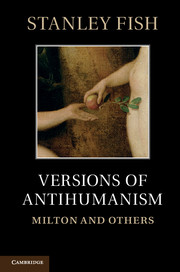Book contents
- Frontmatter
- Contents
- Acknowledgments
- Introduction: intention, historicism and interpretation
- Part I Milton
- Chapter 1 The Brenzel lectures
- Chapter 2 To the pure all things are pure
- Chapter 3 “There is nothing he cannot ask”
- Chapter 4 Why Milton matters; or, against historicism
- Chapter 5 Milton in popular culture
- Chapter 6 How the reviews work
- Chapter 7 The new Milton criticism
- Part II Early modern literature
- Index
- References
Chapter 3 - “There is nothing he cannot ask”
Milton, liberalism, and terrorism
Published online by Cambridge University Press: 05 May 2012
- Frontmatter
- Contents
- Acknowledgments
- Introduction: intention, historicism and interpretation
- Part I Milton
- Chapter 1 The Brenzel lectures
- Chapter 2 To the pure all things are pure
- Chapter 3 “There is nothing he cannot ask”
- Chapter 4 Why Milton matters; or, against historicism
- Chapter 5 Milton in popular culture
- Chapter 6 How the reviews work
- Chapter 7 The new Milton criticism
- Part II Early modern literature
- Index
- References
Summary
PREFACE
Since September 11, 2001, I have found myself the object of criticism from what appear at first to be different directions. From one direction I was chided (along with others) for holding certain philosophical views – labeled post-structuralist and postmodernist – that were said either to be responsible for the country's vulnerability to terrorist attack or to be corrosive of the country's resolve in the aftermath of terrorist violence. The reasoning was that since postmodernism and post-structuralism proclaim the unavailability of universally accepted standards by which actions might be evaluated, this form of thought eliminates the possibility of defending the superiority of the American way of life. According to what postmodernism tells us, some commentators complain, the terrorists' agenda and culture are in principle no better or worse than ours, and, therefore, the judgment that what they did was wrong or evil cannot be supported by reasons all rational persons would accept.
From another direction I was attacked for my reading of Milton's Samson Agonistes, and specifically for my contention that what Samson does in the climactic (although offstage) action of the play – tear down the Philistine temple and kill thousands of men, women, and children – must be considered praiseworthy because he believes (he cannot be sure) that it is what God wants him to do. Obviously, the link between the two criticisms of me is terrorism and especially the terrorism that takes the form of religiously inspired violence. Common to both lines of criticism is the worry that in the absence of an independent measure in relation to which judgments of right and wrong can be made, the moral life becomes a sham, for any act can be justified simply by claiming for it divine inspiration – not the devil, but God made me do it.
- Type
- Chapter
- Information
- Versions of AntihumanismMilton and Others, pp. 79 - 97Publisher: Cambridge University PressPrint publication year: 2012



